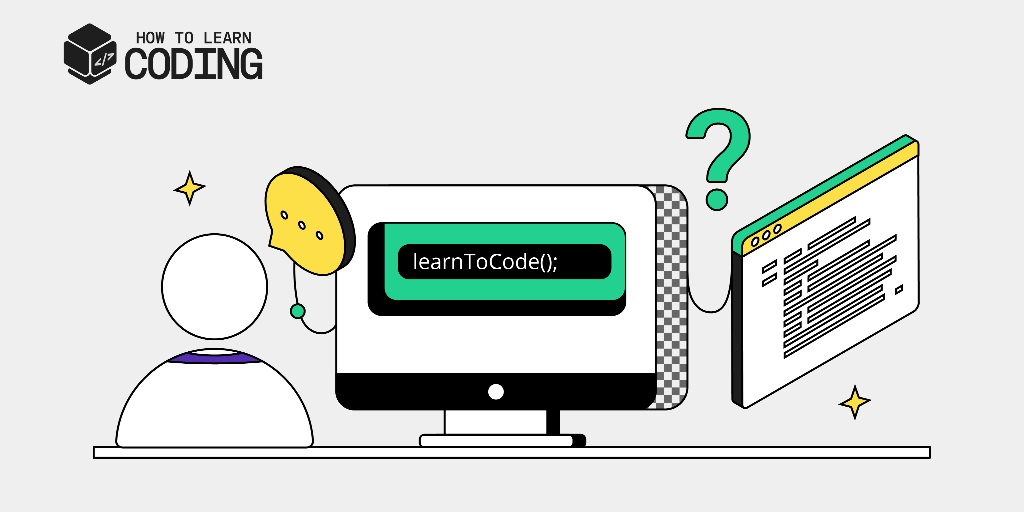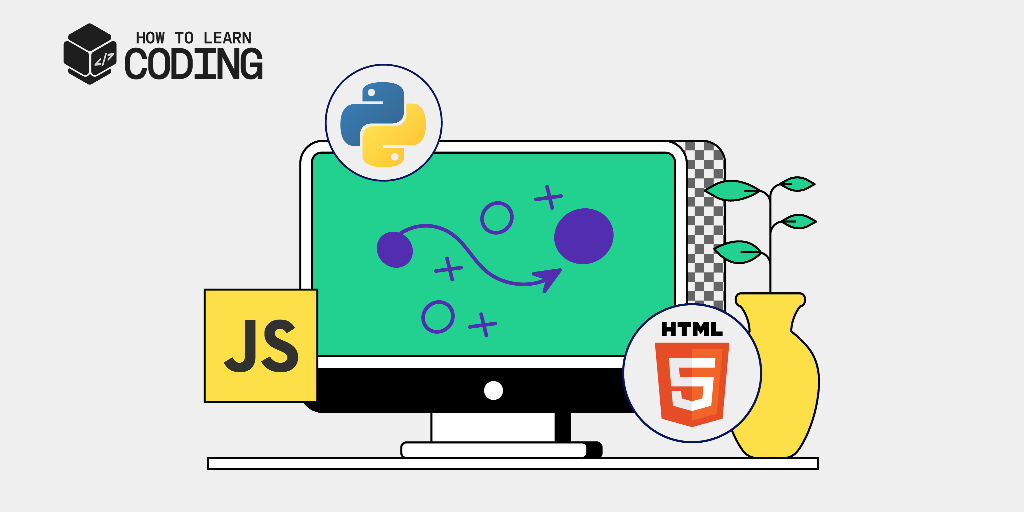Have you ever looked at a website or an app and thought, “I wish I could build something like this”? Building a website or an app is not possible without coding.
The ability to write code has become one of the most valuable skills in this digital age, unlocking doors to exciting careers, side projects, and even full-scale startups. But if you don’t have a computer science degree or any background in tech, you might be asking yourself: Can I really learn coding on my own? Is it possible to go from zero experience to being confident in writing code?
Let’s clear the fog with a motivational story of Jessica. Jessica McKellar started learning to code in her free time, without any formal training, while working as a waitress. She taught herself through online resources and eventually landed a software engineering job at Dropbox. She later went on to become a well-respected figure in the tech community and an advocate for diversity in tech. Her story is a testament to the power of determination, resourcefulness, and self-guided learning.
In this blog, we’ll walk you through what it really means to learn coding independently. We’ll talk about the tools, the ups and downs, and whether this path is the right fit for you. You won’t just get information—you’ll get a sense of direction. Before we explore how you can learn to code on your own, let’s start with a common scenario.
Imagine you’re browsing job boards or LinkedIn and notice how many listings mention Python, JavaScript, or SQL. You hear stories of people who switched careers and became developers in a few months. You wonder if you could do it too—but you don’t want to spend thousands of dollars on a bootcamp or go back to college. That’s when the thought hits: maybe I can just teach myself. And it’s fair to consider. After all, countless people claim to have done exactly that. But what they don’t always tell you is how they did it, what challenges they faced, and what made them stick with it.
That’s what we’re here to explore. So let’s take it from the top: What are the actual benefits of learning to code on your own?
Advantages of learning to code on your own
Learning to code on your own comes with powerful benefits:
- Learn slowly or quickly—whatever suits you. Pause, revisit, or skip ahead based on your comfort.
- Balance coding with work, family, or other commitments. No need to give up your routine.
- Access free resources like YouTube tutorials, coding platforms, and documentation. No expensive degree required.
- Focus on topics you actually enjoy, whether that’s web development, Python, or building games.
- Solving challenges on your own builds real confidence and sharpens your debugging and research skills.
We’ve talked about the benefits of self-learning, but here’s the catch—when you’re learning to code on your own, choosing the right platform can make all the difference. So, what tools or platforms actually support self-taught coders? Let’s explore the best options together.
Self-learning platforms for coding
Many platforms, apps, and communities are designed specifically for self-learners like you. But with so many options, it’s easy to get overwhelmed. So instead of giving you a massive list, we’re going to break down the most effective types of tools you actually need—and some top recommendations for each.
1. Interactive learning platforms
These platforms let you write and test code directly in your browser, offering instant feedback. It’s perfect for beginners who want to learn by doing, not just watching.
Best picks
- Educative: Hands-on courses with no setup required. Great for beginners to intermediate learners.
- freeCodeCamp: Free, with hundreds of hours of coding exercises and projects.
- Codecademy: Beginner-friendly courses in web development, Python, and more. Some content is free, with a Pro plan for deeper learning paths.
Note: These platforms usually start with simple exercises like printing “Hello, World!” and gradually move to real projects like building a weather app or a portfolio website.
2. Video learning platforms
If you learn better by watching someone explain concepts step by step, video platforms can help clarify the “why” behind the code.
Best picks
- YouTube: Tons of high-quality, beginner-friendly tutorials.
- Udemy: Paid courses (often on sale) with lifetime access. Look for top-rated beginner courses in your language of choice.
- Coursera/edX: More structured, university-style learning. Great if you prefer learning with quizzes, assignments, and certificates.
3. Documentation and references
Yes, it might feel boring at first but official documentation is gold. Once you get used to reading it, you’ll unlock the ability to solve problems on your own.
Start with
- Python Docs: Go for this if learning Python.
- MDN Web Docs: Choose it for HTML, CSS, JavaScript.
- W3Schools: Choose it for simple, beginner-friendly references with examples.
Don’t worry if it feels too technical at first. Just skim through what you understand. Over time, it’ll start to make more sense.
4. Problem-solving sites
Once you’ve got the basics down, it’s time to practice. These platforms give you coding problems to solve, helping you build logic and confidence.
Top platforms
- LeetCode: Great for building problem-solving skills and preparing for interviews.
- Educative: Educative also has more interactive interview prep courses.
Even solving one small problem a day builds your skills over time. Don’t worry if you get stuck—that’s part of learning!
When you’re ready to flex your logic muscles, platforms like LeetCode or Educative’s problem-solving tracks are great places to start practicing regularly.
5. Community and mentorship
Learning on your own doesn’t mean being alone. The coding community is huge, welcoming, and always ready to help.
Places to hang out
- Stack Overflow: For technical help and error fixing.
- Reddit: Try subs like r/learnprogramming or [r/coding].
- Discord servers: Many coding communities have live chat, pair programming, and advice.
| Tool Type | Best For | Top Platforms |
|---|---|---|
| Interactive Coding | Hands-on learners | Educative, Codecademy, FreeCodeCamp |
| Video Learning | Visual learners | YouTube, Udemy, Coursera |
| Practice & Problems | Skill builder | LeetCode, HackerRank |
| Docs & References | Deep understanding | Python docs, MDN, W3Schools |
| Community Support | Mentorship and help | Reddit, Discord, Stack Overflow |
You can also join a local coding meetup or an online study group—having a community to share your challenges with can make a big difference. But have you noticed something important? We haven’t yet talked about which programming language you should start with. Let’s explore that next.
Which programming language should you learn first?
One of the most common questions beginners ask is: Which programming language should I start with?
And the truth is—there’s no one-size-fits-all answer. It depends on your goals, interests, and what kind of projects excite you.
Let’s break it down with simple use cases and clear recommendations to help you choose confidently.
Start with Python
Python is widely known as the easiest language for beginners to pick up. It reads like English, has a clean syntax, and lets you focus on learning logic rather than worrying about brackets, semicolons, or weird syntax rules.
What can you build with Python?
- Automate boring tasks.
- Build web apps (using Flask or Django).
- Analyze data or build AI models.
- Create games or desktop tools.
- Scrape websites.
Python isn’t just beginner-friendly—it’s also the language behind some of the most cutting-edge fields today. Want to work in data science? Python is important. Dream of building AI-powered tools or exploring the world of machine learning? Python is the foundation.
From predicting trends with data to training AI to recognize images or text, Python opens the door to exciting, high-impact careers.
Build websites: HTML + CSS + JavaScript
These three are the core technologies of the web. If you’re excited about designing or building websites, this is your starting point.
What you’ll learn
- HTML: The structure of a web page
- CSS: The design and styling
- JavaScript: The interactivity and logic
You’ll eventually move to frameworks like React, Vue, or back-end languages (like Node.js or PHP), but the foundation starts here.
Build mobile apps: JavaScript (React Native) or Dart (Flutter)
Both React Native and Flutter let you build apps for both Android and iOS using a single codebase.
- React Native (JavaScript): Backed by Meta, widely used.
- Flutter (Dart): Backed by Google, great UI capabilities.
Choose based on what feels more intuitive or consider the job market in your area.
Best for: Mobile app developers, startup builders, app enthusiasts.
Career in software engineering: Start with Python, Java, or C++
These are industry-standard languages that teach you the fundamentals of computer science, data structures, algorithms, and back-end development.
- Python: Great for general-purpose and back-end work.
- Java: Widely used in enterprise-level applications.
- C++: Good for understanding memory, performance, and system-level programming.
Build games: Try C# with Unity or C++ with Unreal
Game development is a whole different world, but totally possible for self-learners.
- C# with Unity: Beginner-friendly, great community, tons of tutorials.
- C++ with Unreal: More complex, but very powerful for 3D and AAA games.
Summary of programming languages
| Goal | Language |
|---|---|
| I want to automate stuff/learn fast | Python |
| I want to build websites | HTML + CSS + JavaScript |
| I want to build mobile apps | JavaScript or Dart |
| I want to become a software engineer | Python or Java |
| I want to build games | C# or C++ |
Reminder: Don’t waste too much time choosing the perfect language.
Start with one, stick with it for a few weeks, and you’ll naturally discover what you like.
At this point, you might be feeling confused about your routine, goals, and learning plan. Without consistency, it’s hard to achieve anything. So, let’s work together to set your goals and create a daily schedule that keeps you on track.
Create your own learning plan
So you’ve picked your first programming language—great! Now comes the part that most beginners overlook: how do I actually learn this without getting overwhelmed or giving up?
The key is not how fast you go. It’s how consistently you show up.
Let’s build a realistic and flexible plan, even if you’re a full-time student, employee, or parent.
Step 1: Set a clear goal
Don’t say, “I want to be a software engineer in 30 days.”
Instead, say:
In the next 30 days, I want to learn the basics of Python and build a simple calculator app.
A specific goal keeps you focused and gives you something to celebrate when you reach it.
Examples of beginner goals
- Print your name and age in Python.
- Build a personal homepage with HTML/CSS.
- Create a to-do list app in JavaScript.
- Solve 10 beginner problems on an online coding platform.
Step 2: Create a one-hour daily schedule
You don’t need to spend eight hours a day to get good at coding. One focused hour a day is enough—if you divide it smartly.
Here’s a simple one-hour learning structure:
| Time | Task |
|---|---|
| 20 mins | Watch/read a tutorial or lesson |
| 30 mins | Practice what you just learned (write code, solve a problem) |
| 10 mins | Review or journal what you learned |
Only have 30 minutes? Cut everything in half. Just stay consistent.
Step 3: Right learning resources
Use beginner-friendly platforms that guide you step-by-step. Here are some recommended tools:
- Educative: Interactive text-based lessons (no setup needed).
- freeCodeCamp: Free tutorials and exercises for web dev.
- W3Schools: Great for HTML, CSS, and JS basics.
- Replit/Jupyter Notebooks: Code in your browser.
- YouTube channels: Search “[language] crash course.”
Tip: Avoid jumping from one resource to another too quickly. Stick with one course until you complete it.
Step 4: Build something small every week
You learn best by building, not just by watching videos.
Start with tiny projects:
- A calculator
- A digital clock
- A personal profile web page
- A quiz app
Even if they seem simple, you’ll learn real-world skills like debugging, structuring code, and finishing what you start.
Final remarks
Absolutely—you can learn coding on your own, and many people just like you have done it before. It’s not about having the perfect plan or the most expensive gear. What matters most is your mindset, your consistency, and your willingness to keep going—even when it gets tough. You won’t know everything on day one, and that’s completely okay. Coding isn’t about memorizing—it’s about solving problems, step by step. With practice, curiosity, and the right tools, you’ll be amazed at how far you can go.
Remember Jessica McKellar? She didn’t start out with all the answers—she built her path by learning one concept at a time. And you can too. Whether you’re dreaming of a new career, launching a side hustle, or simply exploring a passion, learning to code is one of the most empowering decisions you can make. So take a deep breath, pick a language (Python is a great start!), and commit to one hour a day. The next success story? It could be yours.



